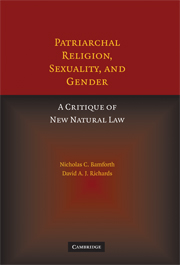Book contents
- Frontmatter
- Contents
- Acknowledgments
- 1 New Natural Law in Context
- 2 Criteria for Evaluating New Natural Law
- 3 The Architecture and Reach of New Natural Law
- 4 Internal Consistency (1): Is New Natural Law Secular?
- 5 Internal Consistency (2): New Natural Law and Thomas Aquinas
- 6 Substantive Appeal (1): What's Wrong with Homophobia and Sexism?
- 7 Substantive Appeal (2): New Natural Law, Sexism, and Homophobia
- 8 Moral Absolutes and the Possible Fundamentalism of New Natural Law
- 9 New Natural Law and Patriarchal Religion
- 10 Concluding Observasions, and Christian Alternatives to New Natural Law
- Bibliography
- Index
2 - Criteria for Evaluating New Natural Law
Published online by Cambridge University Press: 14 August 2009
- Frontmatter
- Contents
- Acknowledgments
- 1 New Natural Law in Context
- 2 Criteria for Evaluating New Natural Law
- 3 The Architecture and Reach of New Natural Law
- 4 Internal Consistency (1): Is New Natural Law Secular?
- 5 Internal Consistency (2): New Natural Law and Thomas Aquinas
- 6 Substantive Appeal (1): What's Wrong with Homophobia and Sexism?
- 7 Substantive Appeal (2): New Natural Law, Sexism, and Homophobia
- 8 Moral Absolutes and the Possible Fundamentalism of New Natural Law
- 9 New Natural Law and Patriarchal Religion
- 10 Concluding Observasions, and Christian Alternatives to New Natural Law
- Bibliography
- Index
Summary
When a theory is concerned – as is new natural law – with the objectives or values that the law should serve, we need for two reasons to select appropriate criteria for evaluating its desirability or workability. First, any evaluation is otherwise likely to lack an intellectually secure foundation, to be unlikely to convince others of the good sense of its conclusions, and to leave itself open to inaccurate or misconceived responses. Second, if we share the characteristic liberal assumption that law, as a coercive device used by the state to regulate social life, requires a sound normative justification if it is to be used legitimately, we may well be helped – by the use of appropriate criteria – to determine whether the theory under scrutiny can provide such a justification. This second reason clearly comes into play in the case of new natural law, given that the new natural lawyers have made clear – not least through their interventions in contemporary constitutional debates concerning sexuality and gender – that they believe their theory to provide a philosophically sound basis for determining the proper reach of the law in regulating people's day-to-day lives. The purpose of this chapter is therefore to explore some criteria that might be used in evaluating new natural law, and to explain the criteria that we shall use in this book.
- Type
- Chapter
- Information
- Patriarchal Religion, Sexuality, and GenderA Critique of New Natural Law, pp. 17 - 55Publisher: Cambridge University PressPrint publication year: 2007



